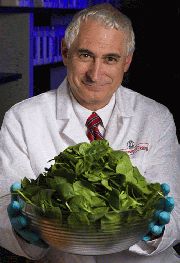U.S. President Obama has been big on the food safety rhetoric but short on actions.
 Sounds familiar.
Sounds familiar.
I don’t expect much from government – providing safe food is the responsibility of producers and everyone from farm-to-fork, government is there to set a minimal standard – so I’m rarely disappointed. Like I tell Amy, the lower you set your expectations of me, the less likely you are to be disappointed.
Lyndsey Layton of the Washington Post reports this morning the Obama administration has had a difficult time filling the post of chief food safety official at the U.S. Department of Agriculture, and it wasn’t until this week — one year into his term — that the president nominated someone to assume that role.
Elisabeth Hagen, 40, a physician with four years’ experience in food safety, was not the first choice. Most of her career has been spent teaching and practicing medicine as an infectious disease specialist. She left medicine in 2006 and went to the USDA, where she was quickly promoted through the ranks of the department’s Food Safety and Inspection Service to become the chief medical officer last year.
Layton reports that last February, the administration approached Mike Doyle, a nationally known microbiologist who directs the Center for Food Safety at the University of Georgia. Doyle said he was offered the job and was vetted, but the day before the announcement was to be made in May, his nomination collapsed.
The White House wanted Doyle to divest his financial interest in a patented microbial wash for meat that he had developed. Doyle offered to defer his interests until his government service was completed but the administration refused, he said.
"It’s just an awful lot to ask for. I would have taken a more than 50 percent pay cut to go to Washington, and this would have been a very big financial hit."
The administration also sought out Caroline Smith Dewaal, the director of food safety at Center for Science in the Public Interest, but Dewaal’s nomination came to a halt in August because she was a registered lobbyist, which violated the administration’s policy against hiring lobbyists.
The Administration didn’t know that before?
Doyle did add this of Hagen:
"I don’t know of her personally. She’s got a steep learning curve."

.jpg) Arthur Allen, a Washington writer and the author of "Ripe: The Search for the Perfect Tomato" (March 2010, Counterpoint), writes that whatever our politics, we increasingly eat from a communal kitchen.
Arthur Allen, a Washington writer and the author of "Ripe: The Search for the Perfect Tomato" (March 2010, Counterpoint), writes that whatever our politics, we increasingly eat from a communal kitchen. .jpg) Based on its evolutionary tree, scientists think that O157:H7 probably has existed for hundreds or even thousands of years. But it hadn’t been noticed in our food supply until 1982, when a small-town doctor in Oregon reported to the CDC that he’d seen a group of patients with bloody diarrhea. Another group got sick with the same symptoms in Michigan a little later. All had eaten hamburgers at McDonald’s, said Michael Doyle, director of the Food Safety Center at the University of Georgia (left, exactly as shown).
Based on its evolutionary tree, scientists think that O157:H7 probably has existed for hundreds or even thousands of years. But it hadn’t been noticed in our food supply until 1982, when a small-town doctor in Oregon reported to the CDC that he’d seen a group of patients with bloody diarrhea. Another group got sick with the same symptoms in Michigan a little later. All had eaten hamburgers at McDonald’s, said Michael Doyle, director of the Food Safety Center at the University of Georgia (left, exactly as shown)..jpeg)
.jpg) On Monday, the
On Monday, the  Michael Doyle (left), professor and director of the Center for Food Safety at the University of Georgia in Griffin, Ga. (Doyle developed an antimicrobial technology that was licensed earlier this year by the makers of Fit produce wash.) said,
Michael Doyle (left), professor and director of the Center for Food Safety at the University of Georgia in Griffin, Ga. (Doyle developed an antimicrobial technology that was licensed earlier this year by the makers of Fit produce wash.) said, I have no idea if Doyle, the Director of the Center For Food Safety at the University of Georgia, is even interested in the job of director of the U.S. Department of Agriculture’s Food Safety and Inspection Service (although I know others who have had the job and it’s not a dream posting) but his name is getting slogged through the mud that is the Intertubes in a manner that does nothing but confirm that journalism shouldn’t be dead just yet. Sometimes it’s important to check things.
I have no idea if Doyle, the Director of the Center For Food Safety at the University of Georgia, is even interested in the job of director of the U.S. Department of Agriculture’s Food Safety and Inspection Service (although I know others who have had the job and it’s not a dream posting) but his name is getting slogged through the mud that is the Intertubes in a manner that does nothing but confirm that journalism shouldn’t be dead just yet. Sometimes it’s important to check things. Apparently, that is driving Connecticut congresswoman Rosa DeLauro nuts, cause
Apparently, that is driving Connecticut congresswoman Rosa DeLauro nuts, cause